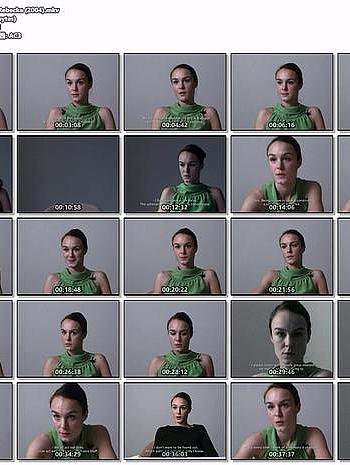
丽贝卡
| 导演: | Miriam Backstrom |
| 主演: | Jennifer Allen |
| 制片国家/地区: | 瑞典 |
| 类型: | 剧情 |
| 语言: | 瑞典语 |
| 年代: | 2004 |
| 上映: | 2004-10-17 |
| 片长: | 40分钟 |
| 豆瓣评分: | 0 |
| 影伴评分: | 0 |
剧情简介
These are just a few of the lines uttered by Rebecka, the woman sitting in front of the camera being interviewed by a voice (Miriam Bäckström). Convinced, and ostensibly genuine, she answers the questions, at times clearly rifling through papers that apparently provide some kind of script. As the interview progresses, we become more and more confused by the person before us. Af... (展开全部)
These are just a few of the lines uttered by Rebecka, the woman sitting in front of the camera being interviewed by a voice (Miriam Bäckström). Convinced, and ostensibly genuine, she answers the questions, at times clearly rifling through papers that apparently provide some kind of script. As the interview progresses, we become more and more confused by the person before us. After having been given different answers to the same question repeated twice , the character makes us suspect that she is not per se the woman we see. In between questions, the interviewer directs Rebecka with more physical instructions such as “Put your hair up again. Go and do it properly.” or “Here you cry. Look into the camera!” Rebecka, usually appearing in a green shirt but at other points wearing a black dress, occasionally directs her face to a second camera, looking straight at us. The more discrepancies arise, the less we get to know about Rebecka; just like the voice off-camera that is interviewing her, her true identity remains concealed, or even obsolete.
Oscillating credibly and compellingly between authentic experience and staged authenticity, Rebecka uses the interview – this assumed guarantee of unstaged speech – as a convoluted diversion from truth, trapping us in the hazy space between fictionalized reality and being. Stating that the most difficult part to perform is the role of her self, Rebecka - played by Rebecka Hemse, a well-known
Swedish actress - draws us into a play on the circumstances of identity, in which all of her supposed selves stay convincingly genuine.
Miriam Bäckström uses a similar strategy in Anonymous Interviews. Here too, the authenticity of the interview is questioned; through headphones we hear extensive parts of conversations between her and a variety of personalities, all dialogues spoken by one and the same actress (Rebecka Hall). As there are no introductions or names addressed in the conversations, the links between the personal stories told and the identities that (presumably) lived them vanish completely. Slips of the tongue and small interruptions caused by the deliberate reading of the script emphasize this ‘fictionality’ or artificiality, yet we would never dare doubt the authority of what we are hearing. Through Bäckström’s intriguing plays on the formation of self we not only question our surrounding reality but, most of all, our own true selves.
Biography
Since the mid-1990s, Miriam Bäckström( Sweden, 1967) has worked with indirect modes of portraiture. She is known for her series of conceptual photographs of museums, film sets and the apartments of deceased people, which probe the limits of documentation by depicting interiors whose appearance of objectivity acquire a fictional quality. In her most recent work, Bäckström focuses on the explicit portrayal of the individual. Bäckström’s work has been shown in exhibitions at Moderna Museet, Stockholm (SWE, 1999), the Istanbul and Venice Biennials (1999), Louisiana Museum of Modern Art Humlebæk (DEN, 2000), Taipei Biennial, Taipei Fine Arts Museum (TRE, 2002), Haus der Kunst München (GER, 2003), Centro Nazionale per le Arti Contemporanee Rome (ITA, 2003), and Museum für Gegenwartskunst Basel (SUI, 2004). Miriam Bäckström lives and works in Stockholm, Sweden.
These are just a few of the lines uttered by Rebecka, the woman sitting in front of the camera being interviewed by a voice (Miriam Bäckström). Convinced, and ostensibly genuine, she answers the questions, at times clearly rifling through papers that apparently provide some kind of script. As the interview progresses, we become more and more confused by the person before us. Af... (展开全部)
These are just a few of the lines uttered by Rebecka, the woman sitting in front of the camera being interviewed by a voice (Miriam Bäckström). Convinced, and ostensibly genuine, she answers the questions, at times clearly rifling through papers that apparently provide some kind of script. As the interview progresses, we become more and more confused by the person before us. After having been given different answers to the same question repeated twice , the character makes us suspect that she is not per se the woman we see. In between questions, the interviewer directs Rebecka with more physical instructions such as “Put your hair up again. Go and do it properly.” or “Here you cry. Look into the camera!” Rebecka, usually appearing in a green shirt but at other points wearing a black dress, occasionally directs her face to a second camera, looking straight at us. The more discrepancies arise, the less we get to know about Rebecka; just like the voice off-camera that is interviewing her, her true identity remains concealed, or even obsolete.
Oscillating credibly and compellingly between authentic experience and staged authenticity, Rebecka uses the interview – this assumed guarantee of unstaged speech – as a convoluted diversion from truth, trapping us in the hazy space between fictionalized reality and being. Stating that the most difficult part to perform is the role of her self, Rebecka - played by Rebecka Hemse, a well-known
Swedish actress - draws us into a play on the circumstances of identity, in which all of her supposed selves stay convincingly genuine.
Miriam Bäckström uses a similar strategy in Anonymous Interviews. Here too, the authenticity of the interview is questioned; through headphones we hear extensive parts of conversations between her and a variety of personalities, all dialogues spoken by one and the same actress (Rebecka Hall). As there are no introductions or names addressed in the conversations, the links between the personal stories told and the identities that (presumably) lived them vanish completely. Slips of the tongue and small interruptions caused by the deliberate reading of the script emphasize this ‘fictionality’ or artificiality, yet we would never dare doubt the authority of what we are hearing. Through Bäckström’s intriguing plays on the formation of self we not only question our surrounding reality but, most of all, our own true selves.
Biography
Since the mid-1990s, Miriam Bäckström( Sweden, 1967) has worked with indirect modes of portraiture. She is known for her series of conceptual photographs of museums, film sets and the apartments of deceased people, which probe the limits of documentation by depicting interiors whose appearance of objectivity acquire a fictional quality. In her most recent work, Bäckström focuses on the explicit portrayal of the individual. Bäckström’s work has been shown in exhibitions at Moderna Museet, Stockholm (SWE, 1999), the Istanbul and Venice Biennials (1999), Louisiana Museum of Modern Art Humlebæk (DEN, 2000), Taipei Biennial, Taipei Fine Arts Museum (TRE, 2002), Haus der Kunst München (GER, 2003), Centro Nazionale per le Arti Contemporanee Rome (ITA, 2003), and Museum für Gegenwartskunst Basel (SUI, 2004). Miriam Bäckström lives and works in Stockholm, Sweden.




